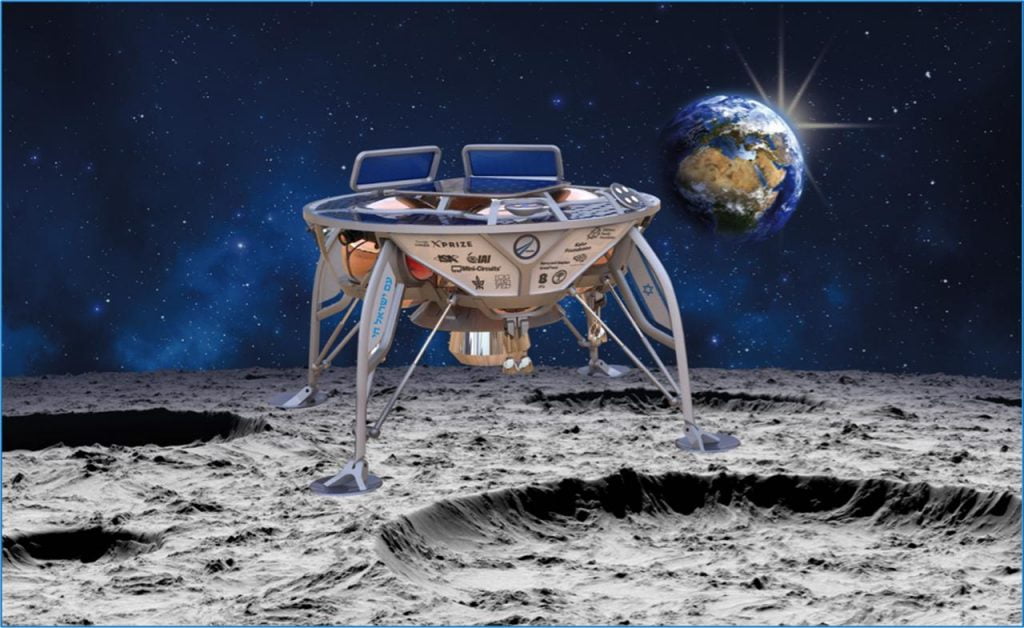Israel’s race to the Moon may soon have to come to a screeching halt as the Israeli startup SpaceIL, one of five finalists in the prestigious Google Lunar XPRIZE competition with a mission to land an unmanned spacecraft on the moon, says it’s short of the funds necessary to complete the project and may have to forfeit.
SpaceIL says it needs to raise $7.5 million by the end of December, or Israel’s dream of becoming the fourth country — after the US, Russia and China — to complete a controlled lunar landing will be dashed.
SEE ALSO: SpaceIL’s Mission To The Moon Says Its Chances Of Winning Google Lunar XPRIZE Are High
The Google Lunar XPRIZE competition started back in 2007 with 33 contenders originally. Israel entered the race in 2012 and is now among five finalists in the last stage — the launch of the spacecraft to Moon — vying for the competition’s grand prize of $20 million. The four other teams it is competing against are Moon Express (USA), Synergy Moon (International), TeamIndus (India) and HAKUTO (Japan).
The competition involves placing a spacecraft on the moon’s surface, traveling 500 meters on the moon, and transmitting high-definition video and images back to Earth. Israel was the first international team in 2015 to sign a contract with aerospace manufacturer SpaceX and to have its financial and technical details approved by the contest.
All the teams are privately funded, with SpaceIL initially securing almost $40 million in total financial backing from American casino mogul Sheldon Adelson, the Morris Kahn Foundation, named after the South-African-Israeli billionaire, the Schusterman Family Foundation, Israeli communications giant Bezeq, Tel Aviv University, and the Israel Aerospace Industries (IAI). It also raised at least $250,000 through a crowdfunding campaign on Indiegogo in 2014.
SpaceIL, founded in 2010 by engineers Yariv Bash, Kfir Damari and Yonatan Weintraub, said in a press statement this week that it was able to secure $22.5 million of the $30 million required to complete the launch and needed to raise the final $7.5 million independently. The startup said the funds will go toward paying private space company Spaceflight Industries for the launch, IAI for building and testing the spacecraft and salaries for its 40 full-time engineers.
SpaceIL CEO Eran Privman tells NoCamels that the latest funding campaign is geared toward private donors and businesspeople, but primarily targets the Israeli government.
“We expect the Israeli government to give us more than the $2 million they have already committed to,” Privman says, adding that SpaceIL was in the midst of ongoing discussions with government representatives, hoping to garner another $6 million.
Privman says SpaceIL’s spacecraft, the “Sparrow”, is in the final stages of completion and was being assembled by IAI, after which there would be a long period of testing before the anticipated launch sometime in 2018.
Sign up for our free weekly newsletter
SubscribeSEE ALSO: Ticket To The Moon: SpaceIL Among Five Google Lunar XPRIZE Finalists To Attempt Moon Landing
The Sparrow, Privman tells Nocamels, is now five feet (1.5 meters) tall with a diameter of approximately five feet and weighs some 330 pounds (150 kg) without fuel and over half a ton (600 kg) with fuel. The spacecraft was recently sent to Germany for testing where researchers simulated a landing.
Privman says SpaceIL was feeling confident that it could secure the needed funds but was proceeding with caution “until the money is in the bank.”
He says the startup has come so far that simply stopping now was inconceivable. “The notion of abandoning a project in such advanced stages, with clear benefits to Israel, is just not right,” he tells NoCamels.
Yigal Harel, SpaceIL’s VP and the head of its Spacecraft Program, says the company has gone “far beyond the point of no return” and believes its backers “will not just let the project collapse.”
“We believe the Israeli government has a vested interest in the project,” Harel tells NoCamels, indicating he thinks the government will come through because “it’s really a national project.”
SpaceIL has said that, should it win the competition, it plans to dedicate the prize money to advancing STEM education in Israel.
Harel says the main goal of the project is to “inspire Israeli kids to learn science, to learn engineering and mathematics, because it’s very important for our country.”
Privman said the impact of the expected launch “and its historic weekslong journey to land on the moon will resonate for years to come.”
Related posts

Editors’ & Readers’ Choice: 10 Favorite NoCamels Articles

Forward Facing: What Does The Future Hold For Israeli High-Tech?

Impact Innovation: Israeli Startups That Could Shape Our Future






Facebook comments